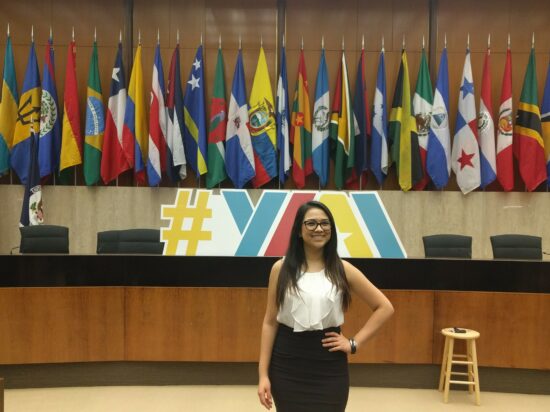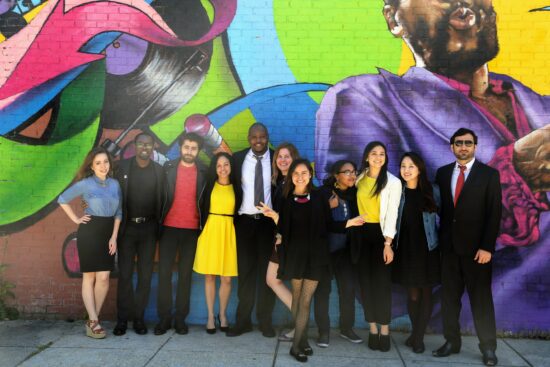For the past two years, the Young Leaders of the Americas Initiative (YLAI) Professional Fellows Program of the U.S. Department of State has brought business and social entrepreneurs from across Latin America and the Caribbean to the United States for a series of professional exchanges. Daniel Bremer-Wirtig, Director of External Affairs at Global Ties U.S. sat down with Brenda Hali, a fellow for Atlas Corps currently working at Meridian International Center (both National Program Agencies), to talk about why this program has been successful.

Brenda Hali strikes a pose during her YLAI fellowship. Photo credit: Brenda Hali
Tell us about yourself: Where are you from and what have you been up to this past year here in the U.S.?
I was born in Mexico City, but I was living in Panama City when I received the offer to be an Atlas Corps Fellow and to serve on the Young Leaders of the Americas Initiative (YLAI) Professional Fellows Program, an initiative sponsored by the U.S. Department of State and implemented by Meridian International Center.
When I learned about YLAI, I immediately felt connected with the purpose of the initiative, and I knew it was the perfect platform to continue my changemaking journey. I came to Washington, DC in May 2016 and participated in the implementation of the program for 2016 and 2017.
I’ve learned something new every day this past year and a half in DC, such as the U.S. business culture, soft diplomacy, pro-fellows initiatives, and the U.S. government’s commitment to international exchange.
What is an Atlas Corps Fellow? Tell me more about Atlas Corps and how talented global professionals like yourself are selected to participate.
The selection process is different for every individual, but the minimum requirements are to be between 22 to 35 years old, have at least three years of experience working in the nonprofit sector, a bachelor’s degree, and English speaking skills.
Atlas Corps receives around 10,000 applications per year, and approximately 60 fellows are selected. I had classmates from 13 different countries from diverse fields, including IT, global health, sexual education, youth empowerment, social entrepreneurship, women’s empowerment and education. This diversity, in all senses, makes every interaction rich and unique.
So, you were an exchange participant, a Fellow with Atlas Corps at Meridian International Center (both Global Ties Network members), and you worked on YLAI which allowed you to travel the U.S. and meet with our members. What is the most valuable lesson you learned from working with such a committed and vibrant network of citizen diplomats?
I had the pleasure to conduct site visits for YLAI and see the amazing job that the Global Ties Network is doing. I met the leaders of these organizations, such as Gergana Kostadinova from WorldDenver, Courtney Brooks from Global Ties KC, and Jacqui Shipe of Global Ties Alabama (editor’s note: Jacqui Shipe also serves as Chair of the Global Ties U.S. Board of Directors) and got to talk with them on a personal level. It was fascinating to hear why they love what they do.
They all agreed on the same thing: to be part of the Global Ties Network and facilitate international exchanges is the best way they could help the development and innovation of their city and its people, and at the same time, impact the world.

Brenda Hali (third from right) hangs out with a group of YLAI participants. Photo credit: Brenda Hali
What do you think are most important takeaways or experiences that the YLAI fellows had while in the U.S.? What do you think the communities that welcomed the fellows and our Global Ties Network members got from hosting this program?
Effective diplomacy is not built by governments and laws, but by citizens. The takeaway for every YLAI fellow has been the removal of prejudices while interacting, studying, and working with people from so many different countries.
We live in an interconnected world, but it is difficult to fully understand or empathize without human interactions. The YLAI program is strategically designed to be implemented in small to medium cities in the U.S. and to make this happen, the Global Ties Network is the best ally.
Once the fellows’ time in the U.S. is finished, those who hosted a fellow can participate in a reverse exchange by then traveling to Latin America and the Caribbean to collaborate on entrepreneurial and community projects with a YLAI alum. I recall on one reverse exchange in 2016 in which a host needed to apply for a passport because it was is first time traveling overseas. This is how we can see that the citizen-to-citizen diplomacy is effective.
Do you have any advice for programmers and participants before, during, and after exchanges that could help enhance the experience and extend the relationships?
Based on my experience from serving seven years in organizations that facilitate cross-cultural and professional international exchanges, here is some of my advice for each stage of the exchange experience:
- Pre-exchange: Set expectations without overselling the exchange. Provide an easy-to-read guide to the program and city overview. Look for strategic partnerships. Make a Google calendar with all the activities each day and share it with the participants. If possible, have a pre-program call with every participant.
- During the exchange: Create Social Media Ambassadors program to promote your brand and document the exchange impact. Make it easy for them to share their impact story with you, use digital platforms like Podio or Google Forms. Assign a Local Cultural Ambassador.Involve the participants in local volunteer initiatives to understand the social reality at the same time that they give back to the community that was their home for certain time.
- After the exchange: Make the participant an international promoter of your program and city. Create a local network of alumni and give them access to U.S. based resources and opportunities.
What’s next for the YLAI program and its participants?
The network that has been built through YLAI is already bearing fruit. A considerable number of U.S. businesses and organizations found allies in the fellows to expand their operations to Latin America and the Caribbean. In turn, the fellows found excellent business partners and mentors with each other and with U.S.-based organizations.
As a result, I see more partnerships and collaborations developing in this big network of citizen diplomats in the U.S. and every country from Latin America and the Caribbean.
